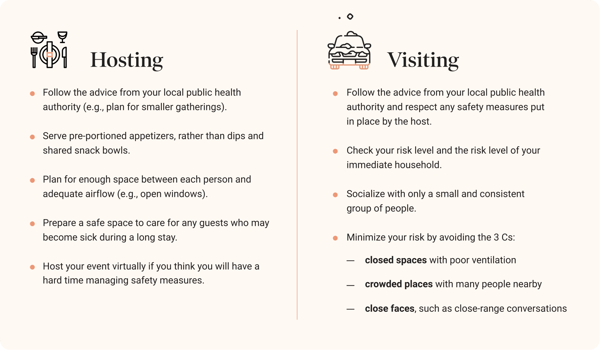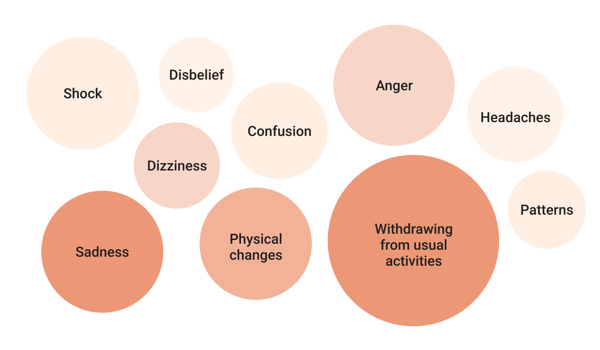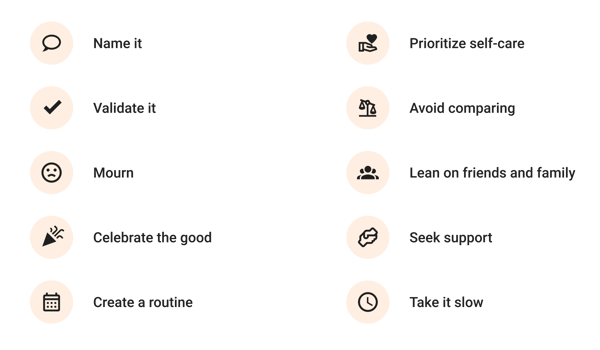The holiday season is often synonymous with joy, celebration, and togetherness. On the flip side, it’s also a period of high stress for many Canadians. The truth is that 64% of people found that the holiday season intensified their mental health issues. So if you’re feeling overwhelmed this time of year, we hear you.
Holiday stress is completely normal. But getting back into holiday habits as we work to recover from COVID-19 can be particularly challenging. Many people are dealing with feelings of grief, loss, and guilt on top of usual holiday stress. If you’re feeling anxious about reintegrating into group social settings, you’re not alone.
Take a look at these psychotherapist-approved strategies, tools, and behaviours to make end-of-year stress a little more manageable.
Reimplementing (healthy) holiday habits
1. Acknowledge and accept your emotions
The holidays trigger a variety of emotions, and some of them can be negative. You may feel guilty about celebrating if you’ve lost someone during the pandemic. You may feel stressed or anxious about being in a big group. You may even feel concerned about putting others at risk. Be respectful towards your emotions and find ways to celebrate that take them into consideration.
2. Communicate your feelings
Discuss how you feel with someone you trust. Use “I” statements to focus on your feelings, but make room to ask how they are feeling, too. Voice your thoughts and concerns about any holiday gatherings.
3. Set necessary and appropriate boundaries
Identify what type of celebration you feel comfortable with. If you decide that big gatherings aren’t for you, here are a few ways you can communicate your boundaries:
-
I want to take some time for myself to recuperate and re-energize.
-
I’d like to make some time to connect virtually instead!
-
Our long-term health is more important to me than short-term joy.
-
I’m feeling a little overwhelmed right now, so I’ll opt out this time.
4. Set realistic expectations
It’s normal for family traditions to change and evolve over time, especially as we adapt to life during and after a pandemic. Recognize how things have changed and manage your expectations accordingly. Be patient with yourself and others if the holidays feel different this year.
5. Whenever possible, plan ahead
Keep your stress levels in check and avoid feeling overwhelmed by focusing on things you can control. Here are examples of things you can get done before the holiday rush:
-
Shop for gifts and house items.
-
Clean and organize your space.
-
Make your guest list if you’re hosting.
-
Plan your menu and ensure it meets special dietary needs.
-
Cook certain items ahead if possible.
6. Practice self-compassion and self-care
Regardless of how you decide to spend your time this holiday season, remember to prioritize your safety and that of others. This also means respecting feelings and choices. Practice self-compassion by asking yourself: What would I say to a friend who felt this way or had this problem? Chances are, you would show kindness.
Creating a safe space in a group setting
With vaccines rolling out and safety regulations slowly relaxing, you may feel reassured in social settings, but don’t get too comfortable. Taking the necessary precautions is still important as we work to protect those who are vulnerable and prevent the spread of new variants of COVID-19. Here is what you should know if you plan to host or attend holiday celebrations.

Coping with grief and loss
Many Canadians experienced some form of loss over the course of the pandemic. Other than the death of loved ones, loss can take on many forms.
 Grief is how we react to loss. It's a normal and natural response to losing something or someone, but it’s often very painful to work through. It can affect our emotions, thoughts, behaviours, and even how we feel physically. Every person manages and experiences grief differently. Here are some ways grief can manifest itself.
Grief is how we react to loss. It's a normal and natural response to losing something or someone, but it’s often very painful to work through. It can affect our emotions, thoughts, behaviours, and even how we feel physically. Every person manages and experiences grief differently. Here are some ways grief can manifest itself.

Recovering from grief can be a long and challenging process. Here are some small steps you can take to facilitate mourning and make grief easier to manage.

Reducing financial stress
It’s true that financial stress is often rooted in economic conditions, such as job loss or unforeseen financial challenges. However, many Canadians experience self-imposed financial stress, particularly during the holiday season. Avoidable financial stress could be caused by social expectations, commitments, competition, materialism, and lack of planning. An effective way to reduce financial stress is to focus on why you celebrate the holidays and what it means to you.
1. Acknowledge your feelings around money
Money often represents security, power, or status. This is especially true if you’re struggling financially or if your loved ones appear to be more financially secure. Recognize feelings of shame, inadequacy, or envy. They may be causing you to go overboard with your holiday spending. Try to understand where these feelings are coming from before they negatively impact your wallet.
2. Analyze your financial well-being
Taking the time to think about how you are doing financially can help you better prepare for the holidays. Are you feeling financially burdened or is money tight right now? Or, on the flip side, are you feeling comfortable with where you are financially?
3. Communicate your financial boundaries
Be open with your friends, family, and loved ones about what type of spending you feel comfortable with this year. Work together to find a solution that takes everyone’s financial well-being into account. Here are some simple ways to celebrate that can alleviate financial stress:
-
Plan for a secret-Santa style gift exchange.
-
Set a budget for gifts and stick to it.
-
Write meaningful letters to loved ones instead of buying gifts.
-
Commit to a potluck-style meal to share the cost of hosting.
4. Create a plan for all your holiday expenses
How many gifts are you planning to purchase this year? Are you also hosting dinner or accommodating out-of-town guests? Preparing a budget for gifts, groceries, hosting, and more can help you keep track of your spending and also help you set boundaries. Identify costs that are out of your financial comfort zone. If needed, share the responsibility with a loved one or ask someone else if they can take over.
5. Take a few minutes for yourself
Making time for yourself during the hectic holidays can help relieve negative emotions. After all, financial stress, like all types of stress, requires a little self-care. Find coping behaviours work best for you. Here are some of our favourites:
-
Incorporate some low-impact movement, like walking or stretching.
-
Try meditation and breathing exercises.
-
Listen to your favourite music or podcast.
-
Focus on a new problem, like crossword puzzles or Sudoku.
-
Take a warm bath to calm the body.
Regardless of how much you plan ahead or how carefully you monitor your stress levels, sometimes we all need a little extra support. Dialogue’s team of mental health professionals is available throughout the holiday season, 24/7, to help you address your stress and anxiety.
Visit the Dialogue app to discover all your health and wellness resources.
Resources
- https://namica.org/blog/handling-stress-during-the-holiday-season/
- https://www.camh.ca/en/health-info/mental-health-and-covid-19/loss-grief-and-healing
- https://ontario.cmha.ca/documents/loss-and-grief-during-the-covid-19-pandemic/
- https://optionb.org/articles/cope-with-financial-worries-during-the-holidays
- https://moneyning.com/money-management/reducing-financial-stress-during-the-holidays/





 Canada (EN)
Canada (EN)
 Global (EN)
Global (EN)








